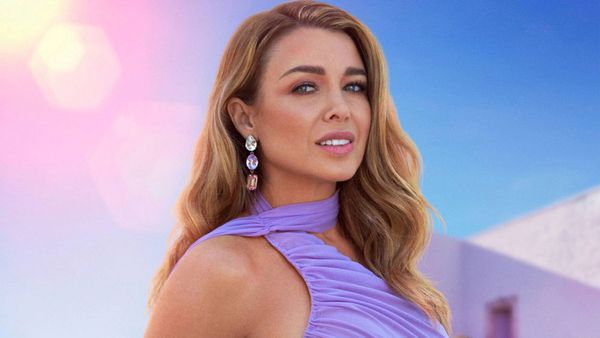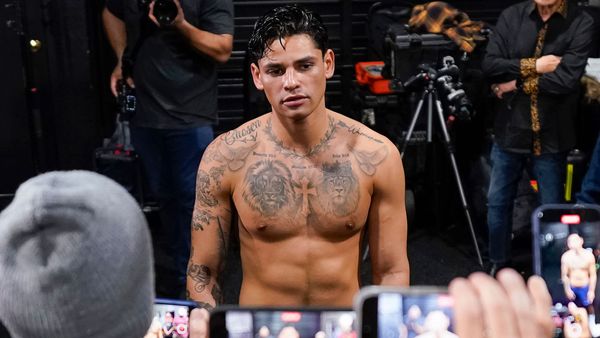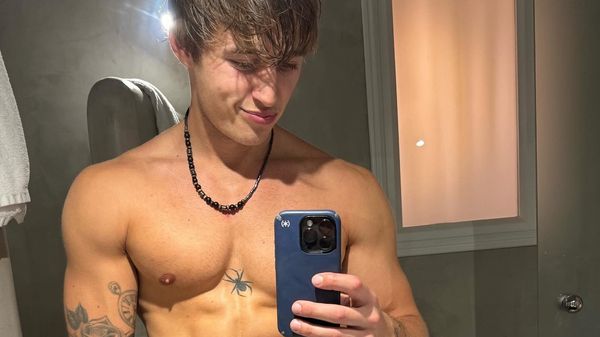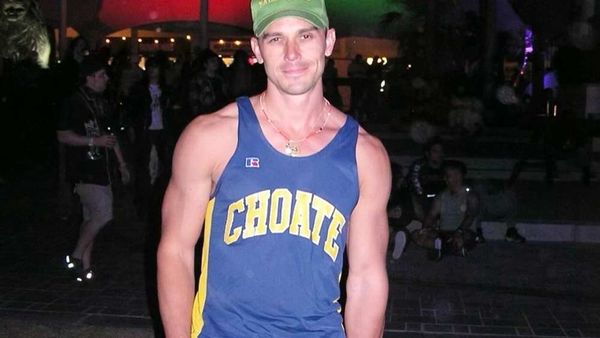Apr 23
How Sarah Ruhl and Taylor Mac Bring 'Orlando' to Joyful Genderfluid Life
Frank J. Avella READ TIME: 14 MIN.
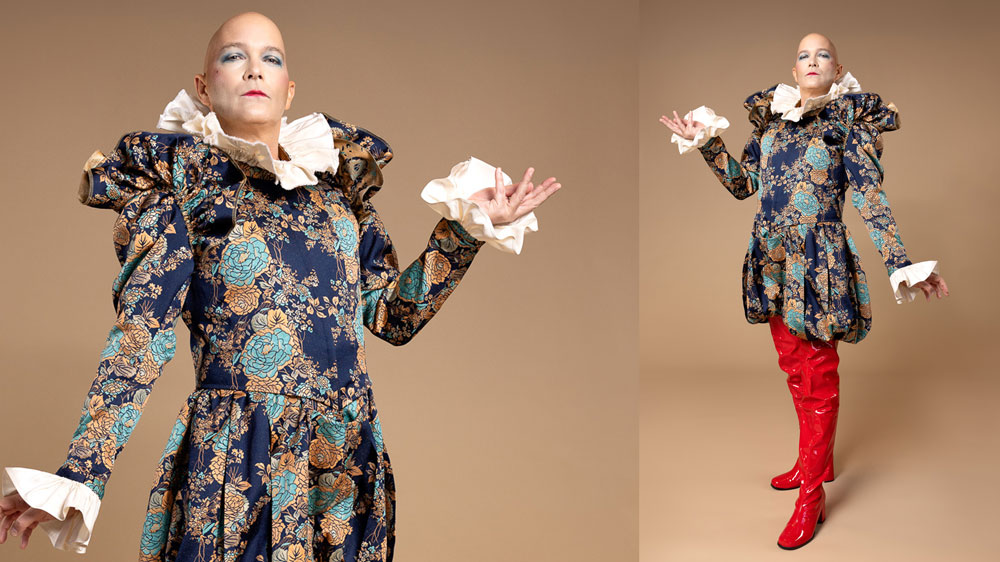
"Orlando" was light years ahead of its time (1928) in terms of its expansive, fluid, liberatory views of gender and sexuality... At times it feels as though we are only now catching up to Virginia Woolf." – Playwright Sarah Ruhl
There have been many adaptations across mediums of Woolf's seminal novel about the adventures of a young man who wakes up one day, a woman, including Sally Potter's celebrated 1992 film that starred Tilda Swinton.
The titular character is based on Woolf's lover Vita Sackville-West. Their relationship was explored by Eileen Atkins in her 1994 play "Vita and Virginia" that she starred in opposite Vanessa Redgrave in 1994. Based on their correspondences, the play was adapted into a 2018 film starring Gemma Arterton and Elizabeth Debicki.
Sarah Ruhl was commissioned to adapt "Orlando" a quarter century ago, by the Piven Workshop in Evanston, Illinois. The play bowed off-Broadway at Classic Stage Company in 2010. This latest Ruhl iteration, produced by Signature Theater, is the queerest, most buoyant version yet, and stars the extraordinary Taylor Mac.
This is an "Orlando" for our time, featuring a gender expansive cast and deft, time-trippy direction by Will Davis. Ruhl's transfixing script combined with Mac's subtle, yet penetrating embodiment delivers a window into the soul of of the epic, century-traveling heroine.
Mac has been super-busy of late. "Bark of Millions," judy's (Taylor's preferred pronoun) most recent work, premiered at the Sydney Opera House and then made its New York premiere at BAM. This summer the musical version of John Berendt's acclaimed novel "Midnight in the Garden of Good and Evil" will bow at the Goodman Theatre of Chicago with a book by Mac and music and lyrics by Jason Robert Brown.
Mac's many stage works include, "Joy and Pandemic," "Gary, A Sequel to Titus Andronicus" (Tony nomination, Best Play), "A 24-Decade History of Popular Music" (Pulitzer finalist), "Hir," and "The Lily's Revenge."
Ruhl, the recipient of numerous awards, is one of our most celebrated playwrights. Her work includes "Letters from Max," "The Oldest Boy," "Stage Kiss," "In the Next Room (or The Vibrator Play)" (Tony nomination for Best Play), "The Clean House" and "How to Transcend a Happy Marriage." In 2020 she collaborated with composer Matthew Aucoin on an operatic version of "Eurydice," her 2003 adaptation of the Orpheus and Eurydice myth, that premiered at the Los Angeles Opera in 2020 and the Metropolitan Opera in 2021.
EDGE had the double-pleasure of zoom chatting with these two extraordinary artists of the American theatre about their collaboration.
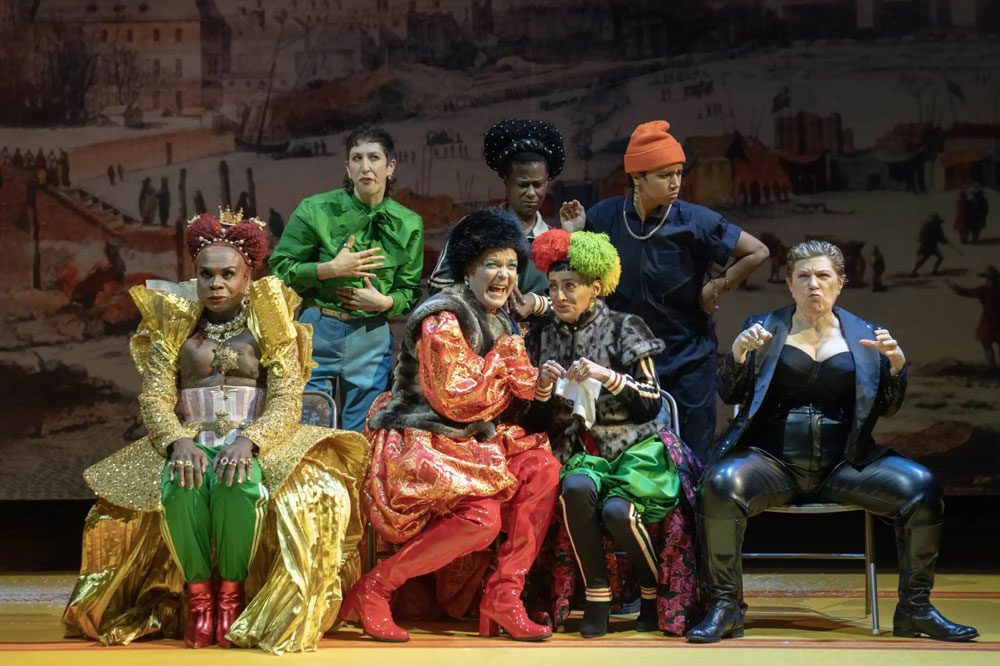
Source: Joan Marcus
EDGE: There is so much joy in this show.
Sarah Ruhl: I think joy is underrated in our culture. And we have been having a lot of joy at "Orlando," which has been good for my soul. I'm glad it's communicating to the audience, too.
EDGE: Sarah, you wrote the first adaptation about 25 years ago, and there have been a number of productions. Can you speak about the journey to this particular incarnation and how it's evolved?
Sarah Ruhl: Sure. I feel like the world is slowly catching up to Virginia Woolf. (laughs) Or at least part of the world... and then the other part of the world is deeply retrograde. It's a wonderful moment to do the play in terms of conversations around gender. 25 years ago, it was a different kind of conversation, both within the theater and outside of the theater. The journey to this particular production was partly me being rhapsodically, entranced, amazed when I saw Taylor do "A 24-Decade History of Popular Music" and thinking, "Oh my God, this is incredible." And Machine Dazzle's costumes and the sense of joy, play transformation, radicalism – (it displayed) a particular kind of connection with the audience that Taylor has. And I was like, "Oh my God, it would be incredible for Taylor to do 'Orlando' one day." (I thought) there's no way Taylor will ever do something that's not Judy's own work. But I was so delighted when it all came together.
EDGE: Taylor, what made you want to be a part of this?
Taylor Mac: I love being in other people's plays. I think that an ideal situation would be to do a play of mine that I'm in, a play of mine that I'm not in and somebody else's play every year. (laughs) That would be the magic sweet spot – a fantasy. It teaches you about your own writing and teaches you about performance, and also it opens up your consideration of the world to work that way... And the specific reason is because it's Sarah and "Orlando." I hadn't read the book, but when we did the reading of the play, I was just smitten.
Now I've read "Orlando." What is deeply profound to me is that there is a gentle queerness in Virginia Woolf's writing and in Sarah's interpretation of Virginia's writing. That's not something that you experience a lot, because queerness is so intent on surviving in terms in the media world. It's kind of in a capitalist rat race. (laughs) "Here we are! We're here! We're queer. Get used to it." That kind of loud and proud, which has been necessary and great and is part of our culture, but it's not often that you get to spend a little time just in gentleness. And we are a gentle people. So, I've just been really appreciative of that. It's really healing to be in this production.
EDGE: "Orlando" seems to return again and again, in various forms. We just had the documentary "Orlando: My Political Biography" and Neil Bartlett's play in London, Sally Potter's film back in the '90s. What do you think it is about "Orlando" that inspires creatives to want to return to it, explore it further and add to the canon?
Sarah Ruhl: It's such an interesting question. I mean, I think it's a masterpiece. That word is laden with all kinds of patriarchal weirdness, so forgive the term, but it's peeling back layers on an onion, and there's room for so many interpretations. I loved "Orlando: My Political Biography" which really took the lid off "Orlando" and created interesting tributaries around it... If a classic is a work that people continue to read, "Orlando" certainly is one. The way it talks about sexuality and gender with a kind of playful innocence is also healing... One thing that drew me to the novel initially was that it was a love letter – a gift from Virginia to Vita. For me, there's something about artworks that start as gifts from one real person to another that give it a shimmer all these years later and that we're still listening in on a primary relationship that was generous and generative...
I imagine Woolf was a very exacting person, an exacting writer. And in her lifetime, she would not have been that interested in "Orlando" having other voices interpreting the novel... But I hope that if she were ghosting around, it would give her pleasure, that there's a robustness and an openness, an enduring quality, that has enough openings for many people to interpret the work.
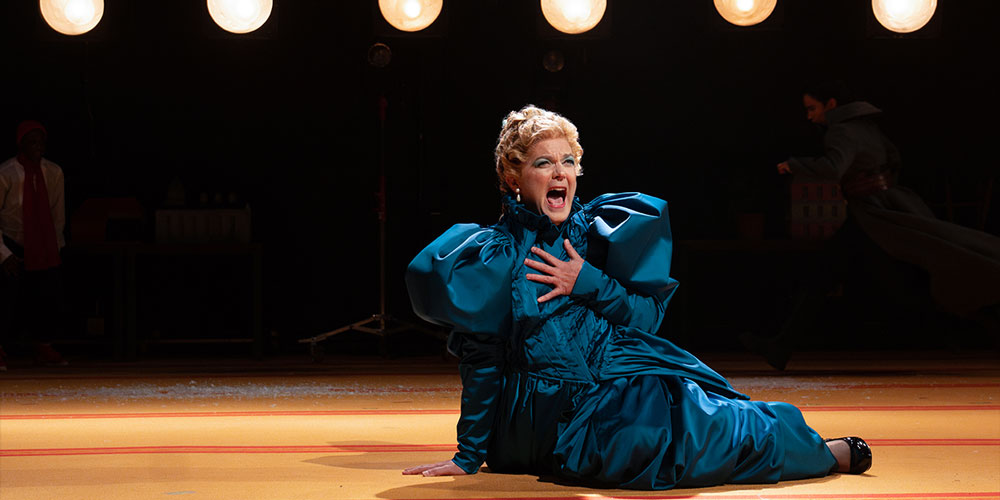
Source: Joan Marcus
EDGE: What has the collaboration with (director) Will Davis been like?
Taylor Mac: Will says that their job is a curator... And I think that that's true, they've curated a beautiful experience. They gathered together an incredible ensemble. We all just immediately connected on the first day, which doesn't always happen. Not to say that's always the goal, or the sign of a positive experience. (laughs) But it was. I feel really instinctually emotionally connected all these people. Will has the thoughtfulness to consider things that another director might just dismiss... They clearly have a beautiful aesthetic. It's nice to be in an elegant production that doesn't feel oppressive because sometimes a minimalist design feels heavy with its exactitude. I don't I don't feel that here.
Sarah Ruhl: I feel I found a collaborator I would love to work with again... I loved working with him and the company-mindedness that was in the room was fantastic. Will deeply values ensemble, which was wonderful for this particular play... Working with Will was a real inspired reminder of these little filaments of joy in the theater that we get to come to work and experience.
EDGE: Taylor, as a dramatist, when you're acting in someone else's work, do you ever feel like you want to make changes to it? Not to Sarah's work, of course, but in other productions. Is making that separation easy for you?
Taylor Mac: Yeah. I mean I think it is. (laughs)
Sarah Ruhl: It is. Totally.
Taylor Mac: I think of playwriting as offerings. I think of all the different departments in the collaborative as offerings... So my feeling is the spirit of the gathering is everybody brings their offering... And that's part of the joy of it... It's a great relief to also not have to be the playwright and the producer and the director. It's really fun for me to just concentrate on one job. But, also, if an actor is busy rewriting the play, then they're not spending time considering the play. They're not spending time wondering about their character within the circumstance of the play. That's how I was trained as an actor – to not judge the material, but to engage and to make my offering to the material which is my performance. The more you try to fix something, the less you're listening... I might discover something in my performance in response to what Sarah has written that makes me alter my perform my offering. And that happens almost every single performance... Last night I just discovered so much stuff that I didn't know about the play. And it's a great delight.
EDGE: One of the things I loved so much about your performance, Taylor, was how subtle it was.
Taylor Mac: (laughs) Words never spoken!
EDGE: There was so many layers you were exploring.
Taylor Mac: The great joy of this particular play is that it goes through the centuries. You can use the various acting styles through the centuries as an anchor. There's the restoration style and that bombastic, declarative style of the 18th century, and then the melodrama of the 19th century. And then the realism of the 20th century. That's how I crafted the performance. I didn't stitch it to all of those. I just anchored it a little bit. So, it allows for everything. And subtlety has always been part of my work, but people don't always notice. (laughs)
Sarah Ruhl: I think that it's an extraordinary thing, Taylor, that you're one of the few actors I know who can weave in and out with no transition between styles and drop in deeply within a style. And then cast it off and be, as you said, in realism in the 20th century... There's not a single moment on stage that's not considered and deeply felt in the moment.
Taylor Mac: It's easy when the material is good and when the material isn't tying you down. Sarah writes poetry, so that allows you to find your way inside the mystery of it. And to be alive inside of the mystery of it. It's really a gift.
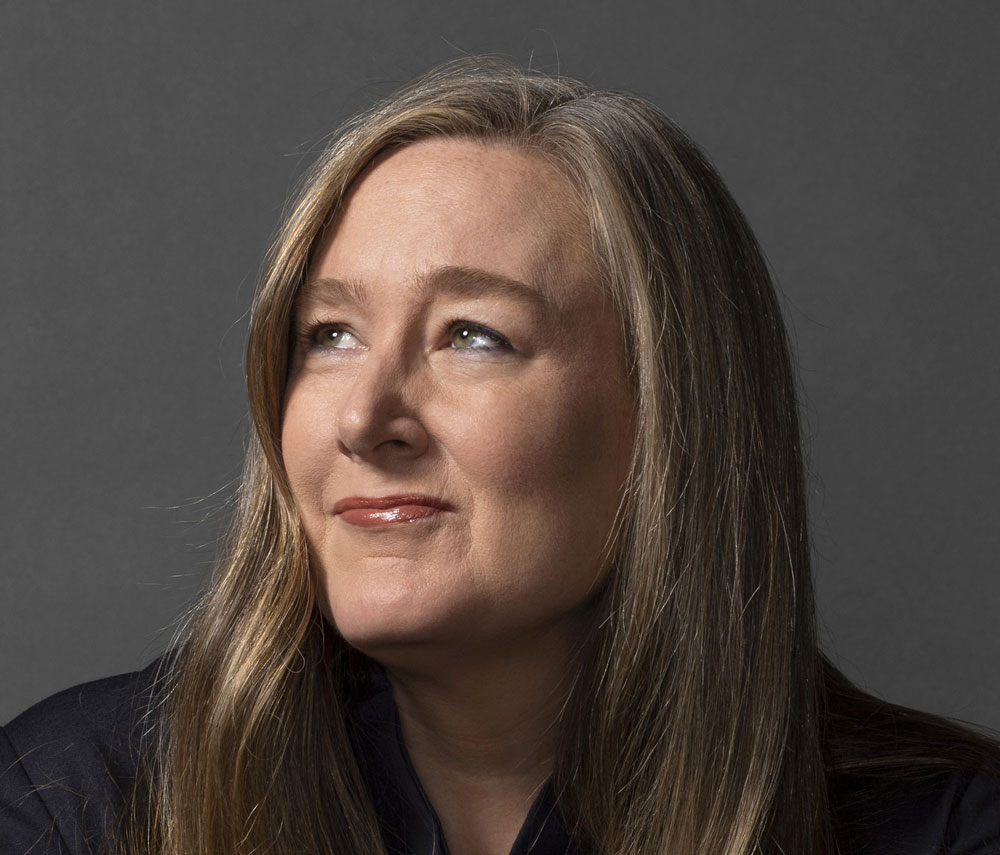
Source: Rebecca Greenfield
EDGE: Sarah also manages to incorporate this cornucopia of themes. One is long accepted gender roles. As a woman, Orlando is startled by the limitations that are now placed on her. To think about that being written 100 years ago, and yet, it could be referring to today.
Sarah Ruhl: Yeah, just to give you one example, when Orlando becomes a woman, she says, "Oh, there's looking in the looking glass that will take an hour of my morning, there's doing my hair." So, I never really go to the gym, but when I turned 50, I was like, I should go to the gym... so it was my first time and I noticed after working out, all these women in the locker room were just looking in the mirror and doing their makeup and doing their hair. It was like an extra half hour on top of their workout. And I was like, what is this strange ritual? They're all looking in the mirror. What an additional time suck after exercising... And I thought of Orlando... I think about the gender warriors going out and saying gender does not have to be this confining and stupid. But yeah, we still have young girls on Instagram being obsessed with their appearance. I think we still have a lot to learn from Virginia Woolf.
EDGE: This adaptation also delved into that creative desire, that quest, with a joyfulness. Orlando's journey felt like a writer's journey.
Sarah Ruhl: Well, when you cast a writer as Orlando, you're going to feel it much more, which I love. In every century, after every heartbreak, Orlando tries to write this long poem. And I think because Taylor's such a brilliant writer, I feel it even more – the attempts and then the ability to finally write the poem at the end.
Taylor Mac: That's another reason why I'm deeply connected to this text. I just feel it all. Sometimes it takes centuries to write something. Every day there's a little death when you're a writer and thousands of deaths... I just feel this play deeply.
EDGE: We're living in insane times in the world, and, specifically, the U.S. For this play to come out right now is significant, with the attacks on the trans community, using them as scapegoats in ways that Russia has been doing with the LGBT community. Not to get too political...
Sarah Ruhl: I think it's really important to say. Between the Pope and the courts and young children – young bullies. It's a terrible, hard time. On the one hand, there's so much hope and a sense of liberation. And on the other this terrible, retrograde backlash. Our company is full of the most wonderful human beings. And I think the show really speaks to young people. Because I think this generation understands intuitively a lot more about gender. And also gets the pain of the backlash that's been happening now. Taylor, I don't know if you have thoughts about just the politics of doing the play in this moment.
Taylor Mac: The concept of gender is so expansive in the play. And it says something radical in that that we are all centuries old, not in the woo way of reincarnation, but in an actual tangible, this is what we've inherited and that we are all these many genders (way). And to center this as a human experience as opposed to an outlier experience – which is what was so nice to be in a cast of all queer people. That's the first time in my life that's ever happened, and I curate most of my experiences. (laughs) So, it's been remarkable to say that this is actually all of us, that there's nothing straight in nature. We are all curved... So the concept that we aren't is about control. I think it's a beautiful play and that Virginia Woolf was having these ideas long before now is also liberating because there's this annoying conversation that this is something that's just new and strange and radical.
One of the things we do, as a company, we celebrate that Virginia Woolf and Vita and Orlando as a metaphor for us all, are actually progenitors. They're part of our history that has been erased or defined as other or different or straightened out a little bit. This is our history. This is our mythology. It's very moving and healing to be in the production. And we've had a lot of young people at the show, and they just freak out over it. They love it.
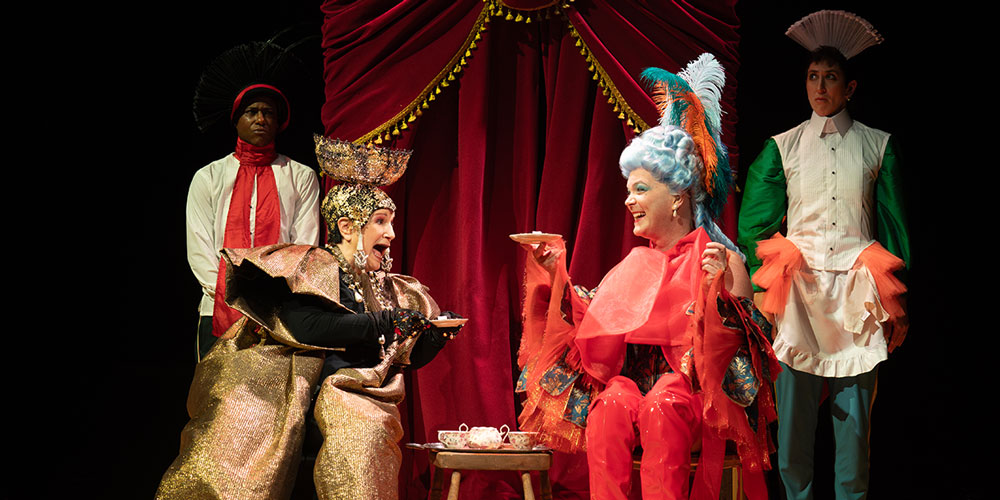
Source: Joan Marcus
EDGE: So, upcoming, Taylor? I don't know when you have time to sleep.
Taylor Mac: It's a busy year. If you talked to me a year ago, I would have been like, I don't have any bookings... I spent all my retirement money. But now it's a busy year from going from "Bark" to this. And then I'm off to Chicago to do "Midnight in the Garden."
Sarah Ruhl: It's the trifecta!
Taylor Mac: I know. It's kind of my fantasy come to life. I just wish it was a little spread out over the year instead of all in the spring.
EDGE: "Midnight in the Garden." Is it going to be queerer than the Clint Eastwood film? I wonder... ?
Taylor Mac: (laughs) Hmmm. I wonder. I made the choice not to make a straight protagonist out of the gay narrator. I made that choice. I wonder why. Yes, is the answer.
EDGE: And Sarah, what is up next for you?
Sarah Ruhl: I, too, am going to work on a musical. I've been working on a show based on "Face in the Crowd" for six years or something with Elvis Costello composing and we're going to do it in London in the fall.
Taylor Mac: You get to work with Elvis Costello! That is so cool.
Sarah Ruhl: I love him so much. I love your trifecta. I feel like my trifecta is more genre related. It's something with music, something not with music and a poem.
EDGE: You're both working on films/novels translated into stage musicals. And this has been a trend that has been successful and not so successful. How do you take something that is specific to one medium and translate it into something that is specific to a different medium?
Sarah Ruhl: I think of us as alchemists, turning one different kind of metal into another kind of metal... And if you get the alchemy right, you totally can make it live in another form. But there has to be something about the original material that has room for that transformation. I used to think it was dumb turning films into musicals for precisely the reason you gave, that it lives beautifully in one medium. But the more I started thinking, well, we're in a kind of weird secular society, religious mythologies are gone or are receding. So are our mythologies. If the Greeks took Zeus and made a play about him, I feel like, in a way, that's what we're doing with movies. It's a kind of mythology that's available, and we're putting it on stage to make people feel something in a different way about it.
Taylor Mac: I agree with that. I think of "Midnight" as a book first... I'm not a fan of the movie. The book sings to me, so it just makes sense. If you're doing the project, because you're trying to further the brand – that's maybe the producer's goal – but that's never my goal. I would never say yes to something, which is about achieving a win in capitalism. I say yes because my heart wants to sing with those characters.
I see it as an exploration and an offering... I love Chablis and I wanted to know what it would be like to hear our consideration of Chablis singing. That's really what it comes down to for me. Because the real Chablis didn't sing... I'm writing a consideration of the offering that she gave the world and then I'm saying what happens when I offer up. And that offering is that she gets to hit high notes. (laughs)
Sarah Ruhl: I love that the idea of the offering and consideration of the character you wanted to see. Funnily enough, "Face in the Crowd," Budd Schulberg wrote it as a short story first called "Your Arkansas Traveler." When I read that I was like, "Oh, I understand how it sings now." It's funny, there's something about the voicings that for me is much easier with the written word then when it's on film.
Taylor Mac: No one would say Shakespeare was wrong for taking the mythology of Romeo and Juliet. That story's been told a million times. There's only so many stories in the world. It's really just you're offering. It's just the offering. That's all.
The Signature Theatre production of Orlando is currently playing at The Pershing Square Signature Center (480 W 42nd St) in The Irene Diamond Stage through May 12, 2024. For tickets, visit signaturetheatre.org/show/orlando.
This interview has been edited for content, clarity, and length.
Frank J. Avella is a proud EDGE and Awards Daily contributor. He serves as the GALECA Industry Liaison and is a Member of the New York Film Critics Online. His award-winning short film, FIG JAM, has shown in Festivals worldwide (figjamfilm.com). Frank's screenplays have won numerous awards in 17 countries. Recently produced plays include LURED & VATICAL FALLS, both O'Neill semifinalists. He is currently working on a highly personal project, FROCI, about the queer Italian/Italian-American experience. He is a proud member of the Dramatists Guild. https://filmfreeway.com/FrankAvella https://muckrack.com/fjaklute

